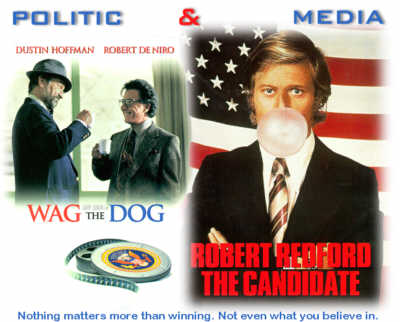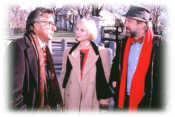 Twenty-six years may have separated them, but Wag the Dog and The
Candidate are spiritual brethren, films that share a common theme: the media
have greatly corrupted the political process by turning citizens into sound
bite conditioned morons. Both films attempt to explore this territory through
the form of satire, but neither succeeds to a significant degree.
Twenty-six years may have separated them, but Wag the Dog and The
Candidate are spiritual brethren, films that share a common theme: the media
have greatly corrupted the political process by turning citizens into sound
bite conditioned morons. Both films attempt to explore this territory through
the form of satire, but neither succeeds to a significant degree.
"Timely" doesn't quite describe the amazing coincidences that surrounded the
release of Wag the Dog. The film told the story of a president who attempts
to divert attention from a burgeoning sex scandal by creating a phony war.
(Actually, it's the president's staff that mainly does this; the president
himself plays little role in the movie.) At virtually the same time, the
Monica Lewinsky absurdity and Clinton's excursions into Iraq took place. Real
life, or Memorex? Spooky!
Unfortunately for the filmmakers, all this free publicity didn't help the
movie at the box office; like most politically-oriented films, Wag the Dog
sank quickly in the theatres, though it enjoyed some success when it hit the
video shelves. I, for one, will not do much to bemoan the movie's lack of
financial might, because you know what? It ain't very good!
Oh, Wag the Dog offers a fairly entertaining 96 minutes of political satire,
but it fails to muster any true insight or substantial wit. For satire to
succeed, it needs either some level of affection or true incisiveness, and
subtlety is preferred. Wag the Dog achieves none of these goals. Look at a
classic like This is Spinal Tap. It worked because it was clever and it
took a gently satirical look at metal bands, an extremely easy target.
The media also make for quite an easy target, but Wag the Dog in no way can
be viewed as either an affectionate or subtle parody. Throughout his many
crass and heavy-handed films, director Barry Levinson has made it clear that
he sees TV and the media as elements in the downfall of the United States.
Okay, "downfall" may be too strong a term, but 1990's Avalon was such a
blatant attack on the media that it should have been subtitled How TV Ruined
the American Family. For a Hollywood liberal-type, Levinson is about as
reactionary as they come, and he possesses no subtlety whatsoever.
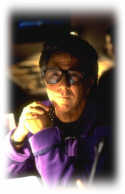 Wag the Dog runs along similar lines as Avalon in that the film makes it
clear what an evil force media and technology can be. Yes, the film posits
some interesting ideas; in this age of easily manipulated images, where we no
longer can trust what we see, how do we know what to believe? Although the
movie's theme that we should be wary and not blindly accept what we see on TV
makes sense, I take issue with the insulting way in which Levinson makes his
case. Basically, it's very clear that he feels the American public is
completely comprised of idiotic chumps who fall for any scheme thrown their
way, and it's up to him to let us know what to do. Levinson clearly is pretty
full of himself and he thinks that it's his job to "educate" all us losers
about the true ways of the world.
Wag the Dog runs along similar lines as Avalon in that the film makes it
clear what an evil force media and technology can be. Yes, the film posits
some interesting ideas; in this age of easily manipulated images, where we no
longer can trust what we see, how do we know what to believe? Although the
movie's theme that we should be wary and not blindly accept what we see on TV
makes sense, I take issue with the insulting way in which Levinson makes his
case. Basically, it's very clear that he feels the American public is
completely comprised of idiotic chumps who fall for any scheme thrown their
way, and it's up to him to let us know what to do. Levinson clearly is pretty
full of himself and he thinks that it's his job to "educate" all us losers
about the true ways of the world.
A lot of Levinson's pretensions could be more easily ignored if he delivered a
consistently funny movie. That doesn't happen here. Wag the Dog offers
occasional laughs, but it simply tries too hard. It tells us over and over
again that it's clever and witty, but it rarely delivers. I find that fault
with much "intellectual" humor is that it so badly wants us to appreciate that
it's sly and incisive that it hardly ever actually amuses me; comedy needs to
virtually completely lack pretense to work. As such, Wag the Dog fails as
much of a comedy.
One unfortunate choice Levinson made for this movie was to attempt a faux-
documentary style. He seems unsure about this decision, because very little
of it comes across rough or awkward, as do actual documentaries. No, his sole
apparent method of using this form is to occasionally do a really quick,
slightly out of focus zoom on a character. We've definitely seen this in real
documentaries; since they usually are filmed with only one camera, the
operator has to quickly shift focus when a different person speaks, and these
kind of abrupt zooms occur. Levinson apparently tries to use this method as a
shorthand for the documentary style, because he doesn't follow through with
any other appearances from that form; virtually the entire movie looks just
like any other Hollywood picture.
Like I said, this isn't new territory for Levinson, and it's at least more
entertaining than the unbelievably sappy and manipulative Avalon. Also, in
many ways, it does provide an entertaining viewing. The film boasts a fine
cast, most of whom do pretty good work. Dustin Hoffman puts in a nice turn as
a film producer hired to give the president's staff their phony war; he comes
across as more relaxed and natural than usual as the naive Stanley Motss.
Robert De Niro offers a surprisingly understated performance as "White House
spinmaster" Conrad Brean; De Niro can chew scenery with the best of them (see
Analyze This?) but he backs off in this part, for the good of the film.
Wag the Dog supplies a terrific group in the supporting roles, from the
sublime Andrea Martin to Denis Leary. Woody Harrelson gives an amusingly over
the top performance as a psychotic "war hero," while Anne Heche does some of
her best work as an anxious member of the president's staff.
No, it's certainly not the cast who are to blame for the failure of Wag the
Dog. Again, it simply comes down to the heavy-handed manner in which
Levinson treats the material and his audience. There's a goldmine of material
here, but it receives such an overbearing treatment that the audience is left
cold. If Levinson could have resisted his urge to shove his viewpoint down
the viewer's throat, this film might have offered a scathing indictment of the
media and the political process; as it stands, Wag the Dog insults rather
than informs.
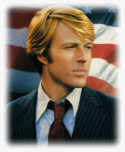 The Candidate treads on similar ground as it follows the making of a
senator. Bill McKay (Robert Redford) starts the film as a young, typically
idealistic early 1970s liberal sort who uses his law firm to Fight the Power.
Political image-makers choose him as a decent candidate to go up against an
apparently unbeatable three-term Republican incumbent. McKay gets enticed
into the campaign because he's promised that he can do and say what he wants;
suspiciously, he accepts because he thinks he can use his position to advance
his pet issues. Of course, most of his integrity goes out the window as it
becomes clear that McKay actually has a shot to win the race.
The Candidate treads on similar ground as it follows the making of a
senator. Bill McKay (Robert Redford) starts the film as a young, typically
idealistic early 1970s liberal sort who uses his law firm to Fight the Power.
Political image-makers choose him as a decent candidate to go up against an
apparently unbeatable three-term Republican incumbent. McKay gets enticed
into the campaign because he's promised that he can do and say what he wants;
suspiciously, he accepts because he thinks he can use his position to advance
his pet issues. Of course, most of his integrity goes out the window as it
becomes clear that McKay actually has a shot to win the race.
The Candidate attempts to show us the struggles that McKay experiences along
his journey, as he tries both to win office and to maintain his soul at the
same time. Unfortunately, while it's certainly a more subtle exploration of
the political process than was Wag the Dog, it remains no more effective.
Occasionally incisive and provocative but more frequently glib and damned near
incoherent, The Candidate seems to bite off more than it could chew. While
I watched this film, I couldn't help but feel that large chunks of it were
missing. The film starts out well, as it shows the beginnings of the campaign
and all of the difficulties that McKay and his handlers encounter as they
battle the seasoned professional politician incumbent, but it abruptly jumps
to much later in the campaign and a point at which McKay has greatly narrowed
the gap and is making a real run for it. This change startled me so that I
still wonder if maybe I blacked out for a few minutes! No, I didn't; the film
just makes a radical change with no explanation.
Other gaps and omissions abound in The Candidate. For a film that's
supposed to be about the transformation than an idealistic young liberal goes
through to become a slick politician, it spends very little time really
exploring that issue. McKay rapidly gets on the bandwagon, and though he
occasionally protests against the substanceless nonsense he spews, he rarely
takes action. Every once in a while, we get the feeling that he's going to
make a stand and do what he feels is right, but the movie glosses over these
moments pretty rapidly.
 The film also loosely hints at but offer little exploration of the effect that
the campaigning has upon McKay's marriage. We get the feeling that his
relations with his wife are going downhill, and we occasionally see glimpses
of a Gloria Steinem-looking woman who may or not be McKay's mistress, but
that's about it. Similarly, we can tell that McKay and his father - who was
previously the very successful governor of California - have very strained
relations, but we learn virtually no information as to the cause of this rift.
In the end, it's just another subject left unexplored in this watchable but
disappointing film.
The film also loosely hints at but offer little exploration of the effect that
the campaigning has upon McKay's marriage. We get the feeling that his
relations with his wife are going downhill, and we occasionally see glimpses
of a Gloria Steinem-looking woman who may or not be McKay's mistress, but
that's about it. Similarly, we can tell that McKay and his father - who was
previously the very successful governor of California - have very strained
relations, but we learn virtually no information as to the cause of this rift.
In the end, it's just another subject left unexplored in this watchable but
disappointing film.
The Candidate certainly contains the kernel of an effective film, and it
treats the viewer with much more respect than did Wag the Dog, but it flits
over its issues so quickly and without serious discussion that its impact
becomes greatly diluted. While most movies run too long, this one's the
opposite; it's too short. We really need at least an extra half an hour of
content to give us more complete information about the characters; we get
content but little in the way of characterization.
The cast members offer consistently strong but not outstanding performances.
Redford is competent and believable in a role that doesn't look like much of a
stretch for him, but he lacks much spark. Peter Boyle's turn as campaign
manager Marvin Lucas also works well but doesn't really compel. Best of the
bunch are Melvyn Douglas in a spunky turn as the senior McKay, and Don Porter
as incumbent senator Crocker Jarmon; he really comes across strongly as the
well-oiled political veteran.
Interestingly, The Candidate also uses many faux documentary techniques, but
it does so with much greater subtlety than the abrupt zooms of Wag the Dog.
Like that film, The Candidate wants to have its cake and eat it too; it
tosses in the occasional bit of roughness that resembles documentary
filmmaking but it usually sticks with more traditional film techniques. While
this style is definitely better integrated than Levinson's work in Wag the
Dog, it still seems artificial and unnecessary.
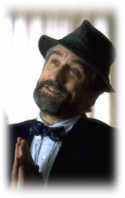 Wag the Dog and The Candidate offer somewhat similar films but their DVD
releases could barely be more different. Wag the Dog is yet another in New
Line's ongoing series of fine DVDs. I'm not going to say that New Line's the
best in the business but... oh, wait, New Line DO make the best DVDs in the
business! Wag the Dog boasts a consistently strong and clean picture that
while not flawless looks pretty good. The image seems occasionally slightly
soft and hazy, but for the most part, it's very nice. While it could have
looked better, it certainly doesn't disappoint.
Wag the Dog and The Candidate offer somewhat similar films but their DVD
releases could barely be more different. Wag the Dog is yet another in New
Line's ongoing series of fine DVDs. I'm not going to say that New Line's the
best in the business but... oh, wait, New Line DO make the best DVDs in the
business! Wag the Dog boasts a consistently strong and clean picture that
while not flawless looks pretty good. The image seems occasionally slightly
soft and hazy, but for the most part, it's very nice. While it could have
looked better, it certainly doesn't disappoint.
The Candidate, on the other hand, features a fairly inferior picture. It
seems pretty sharp through most of the film, and colors usually appear
consistent and accurate. However, the print used has MANY flaws; scratches
and white spots run rampant throughout the movie. The image also not
infrequently seems hazy and grainy. It's a very mixed bag, since portions of
the film look very nice but much of it is plagued by the aforementioned
problems. Unfortunately, the DVD offers a full screen image; while this
framing doesn't seem to cramp the image or eliminate any visual information,
I'd still prefer to have the movie in it original theatrical aspect ratio.
Wag the Dog also clearly wins out in regard to its sound mix. This film
features a subdued but effective Dolby Digital 5.1 mix. Use of the rear
channels is VERY limited - only rare sound effects and occasional music pop up
back there - but the audio is consistently clean and natural. Dire Straits
veteran Mark Knopfler's fine score sounds god and it adds nicely to the
atmosphere. Certainly you won't use this soundtrack to demo your system, but
it does what it needs to do and it does it effectively.
The same clearly cannot be said for the miserable audio on The Candidate.
The film features mono sound, and very bad mono sound at that. It
consistently appears flat, unnatural, harsh, and often badly distorted. "The
Candidate" also boasts some of the worst looped dialogue I've ever heard;
early in the film, a line from Peter Boyle literally sounds like the person
who mastered this DVD didn't like the way his reading came across so the guy
dubbed it in himself! The Candidate is probably the worst-sounding DVD I
own.
Finally, Wag the Dog clearly wins the race for best extras. New Line does
their typically superb job of providing comprehensive and well-produced
supplemental materials. First off is the very interesting and informative
audio commentary from Levinson and Hoffman. Anyone who has listened to the
track that accompanied Sphere knows how dull and disinterested Hoffman
appeared there. Thankfully, his commentary here is much more involved and
entertaining. Hoffman provides a fair amount of insight into his acting
processes; I was fascinated to hear that even after all these years, he still
struggles with nerves and anxiety about new roles. Hoffman also offers some
amusing anecdotes about the production, such as the time when the crew met
Clinton and had to discuss the storyline to Wag the Dog.
As for Levinson's portion of the audio commentary, well, my theory that he's a
self-absorbed gasbag lost no steam here. Essentially, his comments elaborate
upon the patronizing and insulting themes that I discussed earlier. The man
really seems to have virtually no respect for his audience, and while he also
provides some good information about the production, his overarching attitude
of superiority comes through consistently. Well, I still found the commentary
to be pretty interesting.
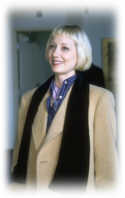 Wag the Dog also includes a 25-minute documentary about film and the media
called From Washington to Hollywood and Back. It's a pretty interesting
exploration of many of the movie's themes, although it seems to largely
attempt to further Levinson's agenda. I felt sorry for poor Tom Brokaw, who
stood out as nearly the sole voice of defense of the media. The rest of the
crew seem so intent on skewering the modern media and eliciting the same old
arguments about how newscasters have gone from bastions of integrity to shrill
hucksters that any form of balance appears lost. Brokaw accurately points out
that although many media outlets certainly have reached lows with their
crassness, the past wasn't necessary as full of integrity as some would like
to believe. The past is rarely as sweet and romantic as most would like to
believe, but don't tell Levinson that.
Wag the Dog also includes a 25-minute documentary about film and the media
called From Washington to Hollywood and Back. It's a pretty interesting
exploration of many of the movie's themes, although it seems to largely
attempt to further Levinson's agenda. I felt sorry for poor Tom Brokaw, who
stood out as nearly the sole voice of defense of the media. The rest of the
crew seem so intent on skewering the modern media and eliciting the same old
arguments about how newscasters have gone from bastions of integrity to shrill
hucksters that any form of balance appears lost. Brokaw accurately points out
that although many media outlets certainly have reached lows with their
crassness, the past wasn't necessary as full of integrity as some would like
to believe. The past is rarely as sweet and romantic as most would like to
believe, but don't tell Levinson that.
Finally, Wag the Dog includes a theatrical trailer, the usual decent cast
and crew biographies, and The Thin Line Between Truth and Fiction, an
informative text essay about the history of political and media-related films
and the origins of Wag the Dog. We also get a fatuous six-minute Valentine
from William H. Macy to screenwriter David Mamet. Yeah, Mamet's good, but I
found this piece pretty useless. Anyway, in the end, this DVD offers a nicely
comprehensive batch of supplements that complement the film.
The Candidate, however, includes little in the way of extras. We get a
trailer and a few fairly insubstantial production notes. That's all, folks!
An audio commentary would have been an extremely welcome addition here.
Ultimately, The Candidate offers a somewhat more substantial viewing
experience than Wag the Dog, but both films certainly lack a coherence and
incisiveness that would have made them more effective films. As DVDs, Wag
the Dog clearly wins here, with yet another top notch production from New
Line; it offers consistently solid picture and sound and a wonderful bounty of
supplemental materials. The Candidate, however, fails on almost all counts
as a DVD. It's main redeeming feature is its bargain price, with an MSRP of
only $19.98; you can have this DVD for about the same price as its VHS
counterpart. However, since Wag the Dog costs only five dollars more, it
clearly makes for a more compelling DVD.
